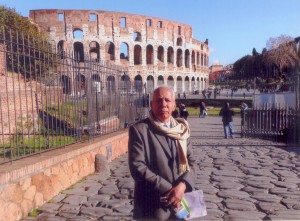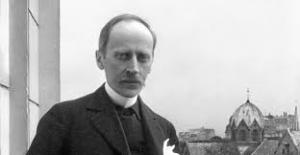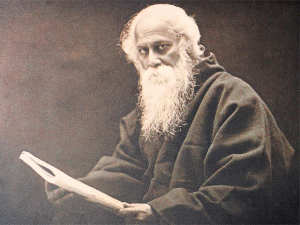Thoughts and thought processes after visiting Rome and Greece historic sites!
 It is a strange thought and yet it is a thought that I would like to register in the minds of Indians and also for others who might be interested in the study of classical world of Greece and Rome. Classical education at Oxford and Cambridge had shaped the modern world by its civilizational values. Classics education is unique to Western European Universities. Schools in the UK, France, Germany and other countries have nurtured school systems known by various names. We had visited the British Public Schools, the French Lycées and also the schools in Switzerland and Germany.
It is a strange thought and yet it is a thought that I would like to register in the minds of Indians and also for others who might be interested in the study of classical world of Greece and Rome. Classical education at Oxford and Cambridge had shaped the modern world by its civilizational values. Classics education is unique to Western European Universities. Schools in the UK, France, Germany and other countries have nurtured school systems known by various names. We had visited the British Public Schools, the French Lycées and also the schools in Switzerland and Germany.
Each of these countries had evolved their schooling systems by their own historic experiences and also by experiments and by freedoms for individual thinkers. The subject needs much study and research for the Indian education policy makers. Here is only a brief outline.
Just now, we have ‘celebrated’ the end of the First World War, also called the Great War, from 1914 to 1918.The one hundred year’s’celebration’ was low key in India. Great Britain, though it is no greater, very little in geographical size has very much reduced in its importance on the rest of the world. There were books and reviews lately as to how we, Indians look at the war. The thousands of men who were sent into the war as sepoys died in thousands by various estimates. One estimate of 70,500 men, mostly uneducated and rural men, largely from Punjab and other states, from the South and elsewhere perished without any trace. The total number of Indians recruited was 1.28 million out of which the high causality was among the Indians. There are various versions and view points from the books.
One book – India, Empire and First World War Culture: Writings, Images and Songs by Santanu Das, Cambridge University Press (Rs.2,145) and another volume by George Morton-Jack, called The Indian Empire at War: From Jihad to Victory, The Untold Story of the Indian Army in the First World War (Little, Brown, Rs.699).
The two books alone, if taken as representative in their view points, one hides the harsh facts, racial slurs, as the soldiers were treated at the Royal Pavilion in Brighton; the British given the times in which the War came about, in1914, kept a stiff upper lip, as though they were doing a favour for the injured and the sick and much else was hidden from the public view. Even today there is very little on the controversial issues.
The other book at least tries to say much about the unjust war and how the Indians were unwillingly thrust into the conflicts that were unsung and untalked about. This happened more so, ironically inside India, inspite of the active role played by our leaders. Morton-Jack touches upon “the glaring injustice done to the colonialized people, fighting and dying for a cause that were not remotely their own”. The total impression we get is that the Brits were unapologetically Raj apologists and even now, after the Brits had lost their empires there is no sign they feel regretful for what they did to the Indian Empire causalities.
How about in India?
The most saddening thing is that the end of the ‘Great War’ didn’t mean anything to the Indians, both the general public as well as the guilty men at the top levels. There are any numbers of monuments inside India, as they are also outside, in France and elsewhere. In Bangalore and Madras, to cite the nearby monuments, also in Delhi, the India Gate, the only monument of all India significance and that there were not anything else to mourn about the great sacrifices made by the unfortunate Indian sepoys in the far-off lands.
Do we have any history in our schools and colleges that remind us what India went through? Sadly, no! I doubt very much about the sensibilities of the Indian people for their past sacrifices from our own experiences during our freedom struggle; from 1885 when the Congress was established, from Dadabhai Naoroji or R.C.Dutt; from the Swadeshi movement; or from 1904 to 1914 when Gandhi returned from South Africa and the other events like the gruesome Amritsar massacre.
Why did the Amritsar massacre evoke a much more critical attitude towards the British treachery? Talking about the British treachery, I am not sure whether Indians know about the British own past, the rarely mentioned, let alone discussed, the British own trait of perfidious Albion. Yes, we not even felt needed the character like Robert Clive who practiced this perfidy, first in Arcot, then in Plassey. Once the British started occupying territory, they forgo their trade and became fully traitors; another like Dalhousie practiced this trait ruthlessly.
In a page by Santanu Das there is a “trenchant critique of Gandhi who had zealously participated in the recruitment campaign while continuing to preaching the doctrine of non-violence! So, we didn’t understand a thing about the Great War, right? We have to say so and it needs much debate and discussion, even the Gandhi-Tagore correspondence has much to shed light on the sensitivities displayed by the two great men of the times.

Gandhi’s own doctrines evolved over the years, no doubt, but the contradictions in the outlook of the Indian leaders was conditioned by their own times. Their understanding of the outside world, the past histories of mankind, in Europe and elsewhere were severely limited. The Indian awakening was all there to play roles to make Indians to exist in such dark times. There were men like SwamiVivekananda and Sri Aurobindo Ghose and others but the political awakening was very limited.
Our English-speaking classes were, it seems, were confined to a very narrow world of jobs and survival or caught in our own spiritual past and did not have the secular concerns. This was a world where Indians were not exposed to the great glories of the civilizations, from Greece to Rome and of the later times. Even the best of the Indian leaders, many of them, highly learned and scholarly, also were misled or were plainly ignorant. They did have only a limited knowledge of the outside world. Their knowledge and education didn’t touch upon the lives of great thinkers and philosophers, from Socrates to Plato or even later times to the great European thought. Hegel and Kant- no one seemed to have had any knowledge or interest. The great British Universities were very self-absorbed. Europe was cut off from India and China. The rise of sciences and the critical thinking, Voltaire and Rousseau were outside the reach of the Indians. They were steeped in total darkness.
British Empire, the Portuguese and the French and other European powers thrived on imperialist competition and land-grabbing. Of course, Indians were sinking in darkness and superstitions. Awakening came much later, Bengal Renaissance was the beginning. I was a loner at Oxford, my background was utterly different. Only after I went to Oxford in 1959, I really started to learn afresh much about the positive strengths and their weaknesses too.
An innate belief in the superiority of the British race must have contributed to overall Indian attitudes towards the ruling white race, also in the belief of the superior wisdom of the Indian official class, the ICS and why even the Indian subordinate staff in the various
government departments.
Luckily, I went to a nationalist school; ironically the foundation stone was laid by none other than the great soul – Mahatma Gandhi. Also, the Ramakrishna Mission School imbibed the ideals of Swami Vivekananda and so there was a streak of nationalist pride in us, the boys in the school. Added to this spirit was my later joining the Shantiniketan and from then onwards I was growing very differently from the rest of the Indian crowd. Now, the critical times came my way during my getting into Oxford by an unorthodox manner may be; the Warden of New College, Sir William Goodenough Hayter, was a former British Ambassador to the then Soviet Union. He must have wanted to give India some importance and so he just admitted me once I started writing letters seeking admission to Oxford.
Now, I landed up at Oxford from a village and my background was rural gentry etc. and from then on, I wanted to learn things my way. My College was a quite well-established one, some 700 years of history and there was strong academic background. Some of my British friends were fresh from Eton, the great English Public School. And once when I mentioned the name of Thucydides, the great Greek historian who wrote the famous book on The Peloponnesian War ( B.C.431), my British Eton College friend started to recite in chaste Greek language – the funeral speech of the great Greek statesman and general, Pericles! This surprised me and inspired me beyond description.Only then I came to learn more about Greece and, later, Rome.There are at Oxford certain academic courses about which no one in India, I am certain had even heard about.
The most rated course at Oxford is the ‘Greats’, the study of Latin and Greek languages and literatures. There are any numbers of scholarships to pursue these courses at Oxford. There are also many combinations with literature, history and philosophies. To make things easy for others, certain other courses are also there, most notably, the ‘modern Greats’, Philosophy, Politics and Economists, the famed PPE! I joined the PPE. Soon I learnt the Oxford ways. I joined the Oxford Debating Union and at the very first meeting I made a speech and got favourable reviews. I joined other student clubs too, Oxford Poetry Club, Oxford Labour Club and some others. It was a three-year course but I was given an exemption after I got First in M.A.in India, at Visva-Bharati. Otherwise, I should have had studied the French language!
The serious point here is that after I bought a pocket edition of the Peloponnesian War, translated by the famed scholar, Livingstone, I started to read more about Greece and Rome.There is a tradition in Oxford that students plan to travel to Rome and Greece over land, by travelling by hitchhiking and otherwise and I was also planning a trip while at Oxford. There was money and time and yet for some unknown reasons that trip didn’t materialize.
But now looking back, some 60 odd years, my life’s fulfillment of seeing Rome and Greece came my way, thanks to propitious circumstances. I was able to realise my dreams that I went with my family and we stayed longer than we anticipated. We spent enough time and explored almost all the historic sites and other monuments.
There were many pleasant encounters too! Sometimes our tourist guide, a pleasant lady, used to look out for us, “the English speaking 5-member family, please wait, I will speak to you separately, as you already know more about this history”, as she was speaking to the
French, German and other European language visitors asking us to stand aside so that she could speak to us separately for she found out that we were the well-read and more eager to know more details!
The serious point I want to make here is that unfortunately, we in India, have been fed on the Macaulay system of education that limited Indians to learn English language only for becoming clerks in various British establishments. The ICS fellows too fell only in this category of obedient and subservient servants of the British colonial masters, right?
Other many more thoughts of much gravitas are: A whole lot of many generations of Indians, starting from the establishment of the East India Company in AD.1600 onwards, we the so-called English educated Indians, from the time of the great Raja Ram Mohan Roy, onwards were not even aware of what the study of Greece and Rome meant for the British ruling classes. The British, the aristocratic upper crust, imagined themselves to have cast in the ancient Greek and Roman multi-touch – Robert Clive started at the bottom of the social order, soon others, the Lords and Earls and other titled names added their own names to the ruling elite! Once the Brits learnt to grab territories in India, Robert Clive’s first victory at Arcot in Madras Presidency to Plassey battle in 1757 where, they also learnt to keep Indians’ ignorance of the great histories of the past. Greece and Rome were of no use for Indian subjects.
An educated Indian must have become an enlightened Indian. Alas! This had never happened. The more colonies the Brits occupied and ruled the more they kept the special secrets of Empire, Imperialism to themselves. Pericles, Julius Caesar and many others and the great battles of the past, the Italian Renaissance, the French Revolution, the European Enlightenment all stayed outside the concerns of the Indians. The maharajas were worse in their ignorance and self-indulgence.
They were strictly kept out of any learning processes or learning any lessons! So, readers can find now, as we submit humbly, that even our great leaders of such stature, Rajaram Mohan Roy of the Bengal Renaissance, even Rabindranath Tagore and Mahatma Gandhi and why even the modern-minded Pandit Jawaharlal Nehru, I submit, operated in a world that was much richer and deeper in many spheres of the working of the man’s mind and reflections.

Alas! Indians missed the many opportunities. Robert Clive, started as a clerk in Madras, rose to become the empire’s greatest achiever! It was only after the battle of Plassey, the British had a taste of the Indian booty and the upper classes, the aristocrats started one Oxford College alone, namely the Balliol which sent out some 23 Viceroys! They were taught Plato as their bible, the one who took so much pride in such achievement was the College Warden, Benjamin Jowett. Indians remained outside their charmed circles. So, we leave the readers at this point, though it is time that we also start learning more on this Perfidious Albion and their treacherous empire-building tales with much more critical eyes than we were fed by the conventional histories descending on India.
What all destructions they had caused; the great famines and pestilence and starvations and deaths on such vast scales. Starting from Clive and ending with the bulldog, Winston Churchill. It is time we start afresh.
We have to recast our education system upside down!We have to teach classics, all the great works of great philosophers, thinkers, ancient histories to European Enlightenment.
Even the great Tagore, in his conception and articulation of a world University, the Visva-Bharati, saw West and East only in modern Europe and modern Asia. So too, others! Though Tagore invited and got great western thinkers like the French saint Sylvain Levi and other Europeans, they too didn’t see the relevance of classical education of Greece and Rome as basic foundations and the Greek philosophy and ancient democracy, Roman law and
Republican virtues.